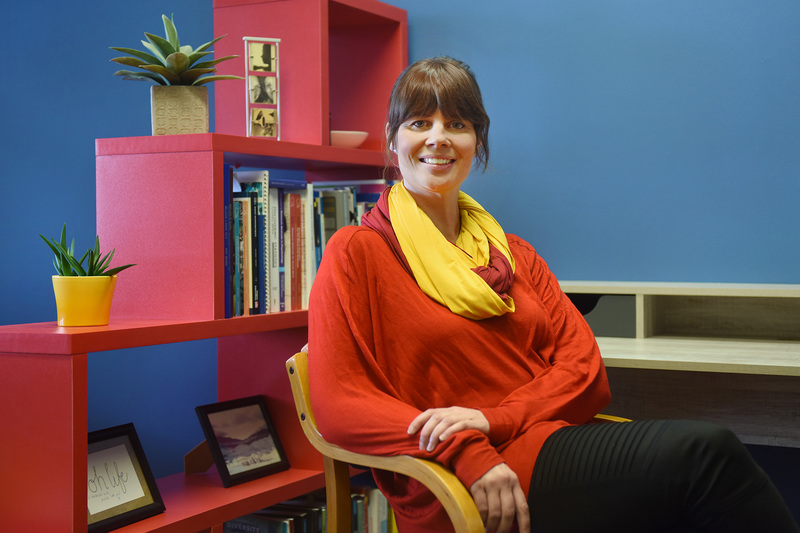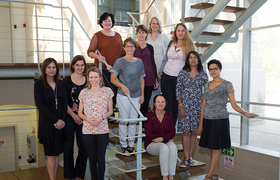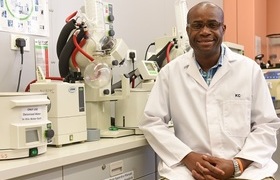Decent work a driver for sustainable lives
14 June 2018 | Story Helen Swingler. Photo Robyn Walker. Read time 7 min.
The new South African Research Chairs Initiative (SARChI) Chair in Creation of Decent Work and Sustainable Livelihood has been awarded to organisational psychologist Associate Professor Ines Meyer. Her work takes a ‘humanomics’ view of a living wage in society.
One of three holders of a SARChI Chair in the Faculty of Commerce, Meyer’s new position will support the National Development Plan Priority Areas.
For the past three and a half years Meyer’s research has explored the living wage as a means of fulfilling United Nations Sustainable Development Goal 8: Decent Work and Economic Growth, and the International Labour Organisation’s (ILO) Decent Work Agenda.
The ILO first developed a normative concept of decent work in their 1999 Decent Work Agenda. The concept was defined along four pillars: Rights at Work, Fostering Employment, Social Protection and Social Dialogue. Plainly put, decent work is generally accepted as work which respects human dignity, secures an adequate livelihood, supports individuals and their families to fully develop their capacities and talents, and is a unifying interest shared globally.
Meyer’s initial researc in the field was done in collaboration with colleagues at Tshwane University of Technology, Massey University Albany, Auckland University of Technology and the ARA Institute of Canterbury (New Zealand). It attracted the interest of the ILO, the UN and the former Minister of Science and Technology, Naledi Pandor, who invited Meyer and her colleagues to present their initial findings at the Department of Science and Technology’s 2016 Science Forum Tshwane.
The research led to the creation of Project GLOW (Global Living Organisational Wage), a network of researchers in more than 25 countries.
Determinants of ‘decent life’
What is novel about the research, says Meyer, is the underlying assumption, first, that it is insufficient to determine wage levels based on economic factors alone, without consideration of psychological variables; and second, that a wage level allowing for a decent life can be determined using such psychological indicators.
“The research is thus embedded in the broader area of seeking innovative ways in which to see work, the purpose of work, and the role of work, employers and employees within society,” she said in her proposal for the chair.
“In this way it aligns directly with the National Development Plan’s priority area Creation of Decent Work and Sustainable Livelihood, and the Medium-Term Strategic Framework’s outcome Sustainable Human Settlements and Improved Quality of Households, which is also one of the outcomes prioritised in the SARChI call.”
Meyer continued: “Since the 1990s, economic growth has been the path to inclusive prosperity in South Africa, and greater participation in the labour market has been seen as key to socio-economic upliftment. Though not always expressed explicitly, it suggests that what matters is that employment is created; not as much what this employment looks like.”
Poor employed
But to date, this strategy has had limited success. Between 2011 and 2016 poverty grew to the extent that it affected over half of South Africans. Another point to watch is the notion that only the unemployed are poor, added Meyer. Poor wage-earners are also caught in a poverty cycle, and can’t create sustainable livelihoods.
“By having to rely on loans to cover basic needs or unexpected expenses, income can become negative over time; thus, low-income earners become poorer because they work. An increase in labour participation rates without at least equal focus on what this employment looks like can thus mean even less sustainable livelihoods.”
“By having to rely on loans to cover basic needs or unexpected expenses, income can become negative over time; thus, low-income earners become poorer because they work.”
This suggests that a shift is needed in how we see employment contributing to inclusive prosperity.
“This is difficult when we implicitly see existing financial, economic and political systems as entities rather than as socially constructed: our view of the nature of systems determines the kind of questions asked. If systems are social constructs, the question of how to make a system work to benefit people is secondary to questions which place the individual first – such as what it is that people require in order to prosper.”
Arts and humanities professor Gary Morson and economics professor Morton Schapiro of Northwestern University, US, and authors of Cents and Sensibility: What Economics Can Learn from the Humanities, have called for a ‘humanomics’ approach: a strong link between the humanities and economics for more applicable economic models, resulting in more effective and just economic policy.
“With its understanding of human behaviour and of people at work, and a strong research foundation, organisational psychology is ideally placed to enter this dialogue,” Meyer stated.
“Its roots in psychology make it fundamentally human-centred. Discipline knowledge about people at work helps in the research work itself, for example, by building conducive conditions for interaction between research stakeholders to enable context-embedded, socially engaged and impactful research. A limited understanding of economic theory can indeed serve as an advantage to innovative thinking and a disruption to dominant discourses.”
On a practical level, humanitarian work psychology has brought organisational psychology into the policy space by moving its focus from the corporate organisation to societies. In South Africa, however, the potential value of organisational psychology is not well known, said Meyer.
The research will require her to establish strong intra-institutional links across UCT’s faculties. One of the aims is to create a cohort of expertise in the area, through postgraduate students and postdoctoral research fellows, via programmes such as UCT’s Emerging Researcher Programme.
 This work is licensed under a Creative Commons Attribution-NoDerivatives 4.0 International License.
This work is licensed under a Creative Commons Attribution-NoDerivatives 4.0 International License.
Please view the republishing articles page for more information.










